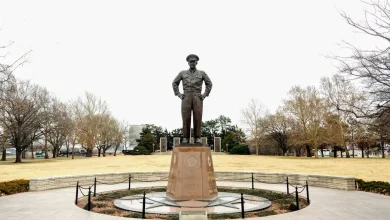The Churchills Secret Army And Life Story
Who Was Winston Churchill?
Sir Winston Leonard Spencer Churchill was one of the most important figures in 20th-century history. He was a British politician, military commander, and Nobel Prize-winning writer, best known for leading Britain during World War II. Churchill was born in 1874 to an aristocratic background. He began his career as a war correspondent and soldier before joining Parliament in 1900. In his long, turbulent political career, he held a number of key positions in the government, including First Lord of the Admiralty and Chancellor of Exchequer. He was also twice Prime Minister. His legacy would be defined by his tenacity and eloquence.
Churchill became Prime Minister of Britain in May 1940 at a moment when Britain was on the verge of defeat. Churchill’s powerful speeches and unwavering resolve helped to rally the nation as the Axis powers were sweeping Europe and Nazi Germany threatened invasion. He helped to shape the Allied Strategy and Churchills Secret Army that led to victory in Europe by forming strong alliances with both the United States of America and the Soviet Union. Churchill was a major player in the shaping of post-war Europe, predicting the Cold War and advocating European unity. Churchill lost his office in 1945 but returned to it in 1951 as Prime Minister and continued to have an influence on world affairs up until his retirement. His legacy will be that of a leader who was resolute and whose courage, vision, and voice guided Britain through its darkest chapter.

Britain’s Secret Resistance Force, 1940
The summer of 40 was one of Britain’s darkest and most unsettling periods. The British Army was miraculously saved from the Dunkirk beaches during Operation Dynamo. However, they returned home without many of their weapons, vehicles and supplies. Britain was alone in the face of the Nazi tide. Hitler’s Wehrmacht, whose victory was assured, loomed just across the English Channel. They were poised to launch an invasion on a full scale under the codename Operation Sea Lion. The threat was imminent, and morale in Britain was on the edge.
Winston Churchill, in response to the dire situation, took covert and drastic action. He authorised the formation of the Auxiliary units, a top-secret resistance force. The clandestine network of auxiliary units was created to operate behind enemy lines if the Germans were successful in occupying Britain. These units, unlike the regular army, were made up of civilian volunteers, many of whom were too young or too old to serve in the war effort, and others were serving in occupations that were reserved for the military. They were farmers, estate workers, gamekeepers and rural labourers, who were familiar with the land and willing to fight in shadows.
Around 3,500 men from rural and coastal counties were recruited in secret. Their mission was shrouded in extreme secrecy. The Official Secrets Act was signed by every recruit, and many never revealed their secret role to their family. Many families thought they were just part of the Home Guard and were unaware that they were training as Britain’s guerrilla forces.
Each unit consisted of 5-6 men who were all trained in sabotage and demolition, silent killing and survival. The strategy was clear: as soon as the enemy invaded, they would retreat to specially built underground bunkers called Operational Bases (OBs). These bunkers were camouflaged in the countryside and stocked with explosives, weapons, food, supplies, and other items that would last for only a few days–the lifespan of an Auxiliary soldier after the invasion.
The men would then emerge from these OBs at night and carry out acts of sabotage, such as destroying fuel depots and cutting transport lines. They would also attack enemy headquarters and assassinate key figures, including high-ranking German and British collaborators. It was a grim, near-suicidal mission that was essential. Churchill knew that even though Britain’s conventional military might was overpowered, the spirit of resistance must remain alive. The Auxiliary Units were an embodiment of this determination.
The Auxiliary Units never saw action and were never called to battle, but their very existence sent an important message: Britain will never surrender, even if it means fighting from below the earth.

Winston Churchill Leadership During World War II
Winston Churchill prepared, knowingly or unknowingly, for the enormous task of leading Britain in its darkest hour. Churchill was a romantic and a patriot who believed in Britain’s future as a global power. As a war reporter, soldier, historian and experienced politician, Churchill’s life experiences shaped him into a man who thrived during times of national crisis and high stakes. Churchill’s moment came when the world was once again plunged into war, despite years of exile and being dismissed as too aggressive or outdated by many.
Churchill was reinstated as First Lord of Admiralty by Prime Minister Neville Chamberlain on September 3, 1939. This was the day Britain declared war against Germany. Churchill’s return was so significant that the Royal Navy announced: “Winston has returned.” Days later, Franklin D. Roosevelt reached out, beginning one of the greatest wartime partnerships ever. Churchill’s unrelenting energy soon spread throughout the British government. His famous “Minutes”, filled with urgency and calls for quick action, were sent to his subordinates and colleagues. Churchill’s vigour could not bring about meaningful cooperation in the Anglo-French Alliance. The period known as the “Phoney War” dragged on, and military operations in Norway, including the Narvik and Trondheim campaigns, floundered–uncomfortably reminding many of Churchill’s World War I failures at Gallipoli. Churchill, unlike during the earlier conflict, stood by Chamberlain. Perhaps he had learned the importance of unity when faced with a looming disaster.
Formation of the Grand Alliance
Winston Churchill reacted immediately and decisively when Adolf Hitler launched his surprise invasion of the Soviet Union in June 1941. Churchill, despite his longstanding opposition to Communism in radio broadcasts on June 22, made it clear that Nazi Germany posed a greater threat. He declared that the Russian threat was ours, and offered support to the Soviets. Churchill, determined to form a strong coalition against Hitler and include Britain, the United States, Soviet Union, pursued the concept of a “grand alliance” that would involve them. A 20-year Anglo Soviet pact of mutual aid was signed in May 1942, after complex and cautious negotiations.
The Pearl Harbour attack of December 7, 1941, changed the dynamics of war. Churchill travelled immediately to Washington, D.C., and he formed several strategic agreements with President Franklin D. Roosevelt. The agreements included the creation of joint boards to coordinate military and economic resources, a unified command on all fronts and the decision to prioritise the defeat of Germany. These decisions brought the grand alliance to fruition, an alliance that Churchill tirelessly envisioned.

Churchill made it his main objective to maintain this alliance for the next three-and-a-half years. Churchill’s close relationship with Roosevelt was crucial in maintaining the partnership, even when there were disagreements. Churchill was under pressure from both domestic and international sources in 1942 over the military defeats in Asia and North Africa. He also faced criticism from Joseph Stalin, who wanted a second front to be opened in Europe. Churchill’s leadership remained firm despite these challenges. In the same year, Churchill’s government began to move leftward. This set the stage for social reforms after World War II, including Churchill’s endorsement of Beveridge’s social insurance program.
Legacy of Winston Churchill’s
Winston Churchill’s steadfast leadership is widely praised for the time he led Britain alone in World War II against the Axis. His strong speeches, strategic choices, and unwavering resolve were crucial in rallying Britain and securing the victory of the Allies. He became a hero of the nation and a symbol of courage and perseverance because of these efforts. In 1953, his literary accomplishments also added to his legacy. He won the Nobel Prize in Literature for his stirring oratory and historical writings.
Churchill’s legacy has not been without controversy. Modern evaluations have criticised his support for the British Empire and resistance to Indian Independence, as well as decisions made during events such as the Bengal Famine. This complexity has sparked a debate about his historical role. Churchill is still one of the most important figures in British History. In a BBC poll conducted in 2002, Churchill was named “Greatest Briton Of All Time”, surpassing icons like Charles Darwin and William Shakespeare. This affirmed his impact on national identity and global affairs.




